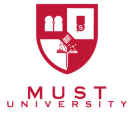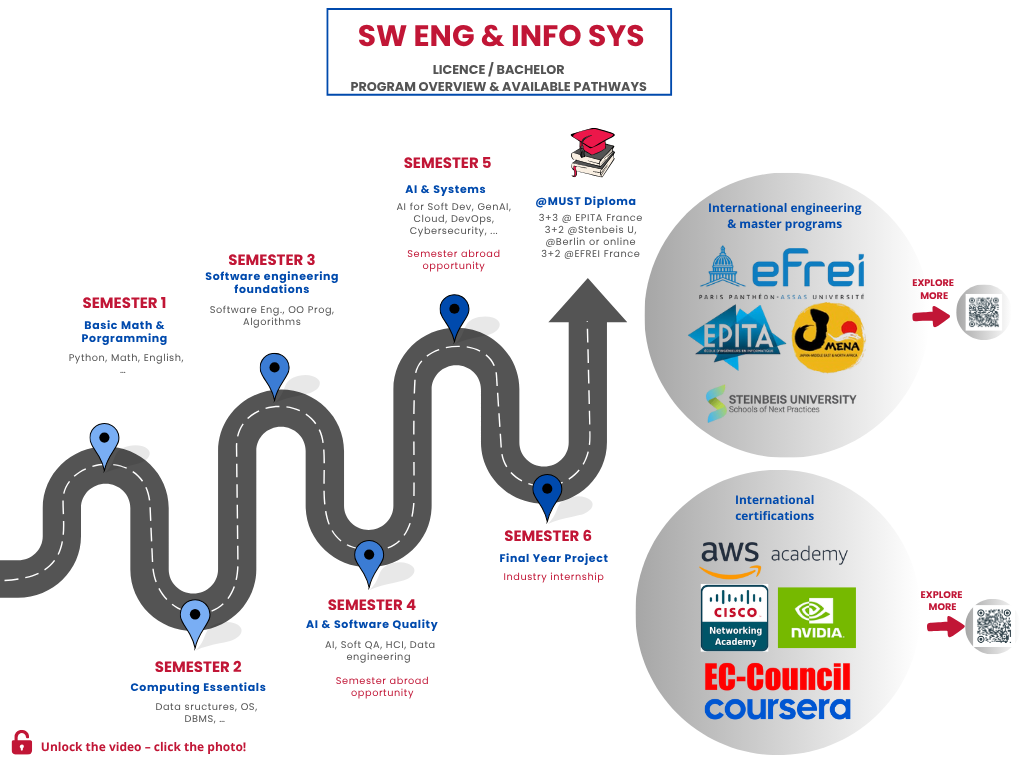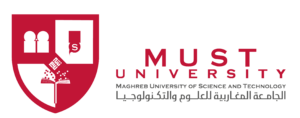Software Engineering & Information Systems
⸺ This program is designed to help students acquire the necessary foundation for further graduate studies in the discipline but also to be able to join the software engineering industry. It aims to train IT specialists capable of designing, analyzing, evaluating, developing, testing, implementing, and maintaining IT systems. The overall goal is that, within a few years of successfully completing a Licence in Software Engineering and Information Systems, graduates employed in the industry will demonstrate career advancement through leadership, technical responsibility, significant technical achievement, or other recognition of their effective contributions.
Language
Duration
Level
Approach
Students must be holders of a Tunisian Bac or international equivalent of the following type:
- Bac Maths
- Bac Sciences expérimentales
- Bac Informatique
- Bac Technique
- Diplôme international + équivalence Bac
The goal of the program is to train IT specialists capable of designing, analyzing, evaluating, developing, testing, implementing, and maintaining complex IT applications and systems.
The program will enable graduates, in particular, to:
- Design and develop computer applications according to rigorous engineering standards (software).
- Employ AI tools in the various stages of software development, from design to maintenance.
- Perform basic data management and analysis.
- Manage complex IT projects and systems .
- Evaluate, administer, and maintain computer systems.
- Acquire skills for effective communication, presentation, and group work in a professional context
- Acquire a changemaker, critical thinking and problem solving mindset.
Graduates of the Licence in Software Engineering and Information Systems can continue their education to get a Master or Engineering degree in a related field. They can also join the industry to work on the development and maintenance of complex information systems and applications.
Specific example careers include:
- Software application developer/engineer.
- Software tester/Software quality engineer.
- Software project manager.
- Database/IT System administrator.
- Information systems analyst/IT solutions integrator.
- AI Engineer.
Within a few years of successfully completing the Licence program, graduates employed in the industry will demonstrate career advancement through leadership, technical responsibility, significant technical achievement, or other recognition of their effective contributions. In addition, graduates will be adequately prepared for a modern professional environment where they would be able to: apply the acquired skills in effective communication, responsible teamwork, and time management; demonstrate professional attitude and ethical decision making; and/or establish their own business.
Graduates of the Licence in Software Engineering & Information Systems can continue their education to get a Master or Engineering degree in a related field. They can also join the industry to work on the development and maintenance of advanced software and computer-based systems. The application of these technologies span industrial computing, automation, health informatics, smart agriculture, and smart cities. They can join a team to launch a startup to develop solutions relying on these technologies to serve the needs of clients in a variety of sectors.
Software Engineering Students often acquire a number of professional certifications in parallel with their formal training thanks to MUST’s Professional Certification (PCP). In particular, and concurrently with their studies, our students have access to free certifications provided by EC-Council, the owner and developer of the world-famous internationally recognized training programs such Certified Ethical Hacker (CEH), Certified Forensics Investigator, Certified Security Analyst (ECSA), Certified Network Defender, Certified Cloud security engineer, Blockchain developer, among others.
They can also acquire professional certifications offered by leading technology companies, including IBM, Google, and Cisco, through MUST’s Coursera For Campus platform. Certifications are available in various areas including system & network management, cloud computing, cybersecurity, data science, artificial intelligence, machine learning, database management & administration, “Communicating and Interacting Effectively”, and “Thinking Critically and Creatively”.
| Course Code | Course Title | UE | ||
| MATH 111 | Math I | UEF 110 | ||
| CS 121 | Programming I | UEF 120 | ||
| CS 161 | Introduction to computer systems | UEF 130 | ||
| CSE 123 | Introduction to Digital Systems | UEF 140 | ||
| ENG 101 | Academic English | UET 110 | ||
| ISS 166 | Freshman Seminar | UET 110 |
| Course Code | Course Title | UE | ||
| MATH 112 | Math II | UEF 210 | ||
| CS 141 | Data structures & algorithms | UEF 220 | ||
| CS 203 | Introduction to operating systems | UEF 230 | ||
| CS 231 | Introduction to databases | UEF 240 | ||
| ENG 121 | English composition | UET 210 | ||
| COM 131 | Public Speaking Seminar | UET 210 |
| Course Code | Course Title | UE | ||
| MATH 270 | Probability & statistics | UEF 310 | ||
| CS 342 | Algorithms & Complexity | UEF 320 | ||
| CS 328 | OO Software design & construction | UEF 330 | ||
| CS 411 | Computer Networks | UEF 340 | ||
| COM 225 | Business & Technical Communication | UET 310 | ||
| CS 321 | Principles of software engineering | UEO 310 |
| Course Code | Course Title | UE | ||
| CS 336 | Data warehousing & management | UEF 410 | ||
| CS 425 | Web application development | UEF 420 | ||
| CS 428 | Software Testing & quality assurance | UEF 430 | ||
| CS 481 | Artificial intelligence | UEF 440 | ||
| PHIL 222 | Contemporary Issues in Data Ethics | UET 410 | ||
| CS 370 | Human Computer Interaction | UEO 410 |
| Course Code | Course Title | UE | ||
| CS 455 | Cloud computing | UEF 510 | ||
| CS 426 | Mobile application development | UEF 520 | ||
| CS 412 | Computer security | UEF 530 | ||
| CS 423 | Software architecture & design patterns | UEF 540 | ||
| Business & Entrepreneurship Elective | UET 510 | |||
| MGMT 322 | Project management | UEO 510 |
| Course Code | Course Title | UE | ||
| ISS 321 | Capstone project/Internship (Stage de fin d’études) | UEF 610 |


